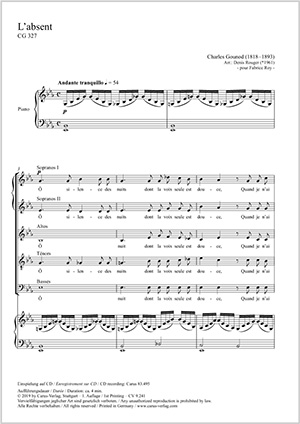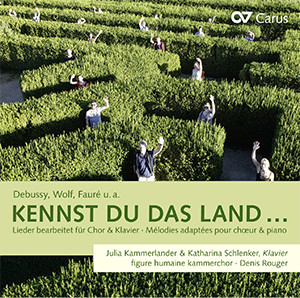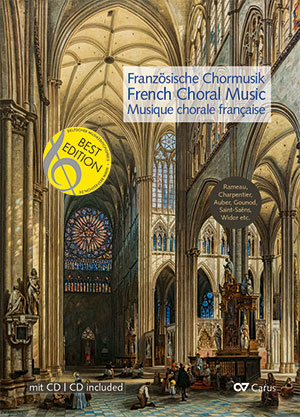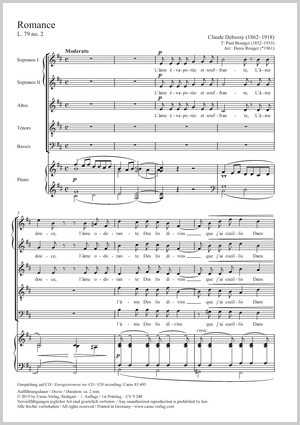
In Charles Gounod’s L’absent, composed in 1873, "the absent one" asks at night time whether the beloved remembers him in the light of the moon and at the sound of the evening prayer bells.
These art songs were originally composed not for chamber choir, but for solo voice and piano. Denis Rouger has carefully adapted them to suit the requirements and expressive possibilities offered by a larger ensemble, without losing the any of the qualities of the original in the process. Each part in the choir has a melodic line drawn from the harmonic and rhythmic framework. In the process, the variety and refinement of the choral language combines with an enormous flexibility in form and expression, as French melodies or German art song demand from a soloist and pianist. The songs have been recorded by the figure humaine chamber choir on the CD "Kennst du das Land ..." (Carus 83.495).
-
Composer
Charles Gounod
| 1818-1893Charles Gounod is known today especially as the composer of the operas Faust (1859) and Roméo et Juliette (1867), and of the very popular Méditation sur le 1er prélude de piano de J. S. Bach (1852), arranged in 1859 as an Ave Maria. The fact that Gounod is regarded primarily as an important opera composer does not do justice to his extensive œuvre, which encompasses all genres. His creative output is dominated by his church music, which overshadows that of all other 19th-century composers. Personal details
-
Songwriter / Librettist
Charles Gounod
| 1818-1893Charles Gounod is known today especially as the composer of the operas Faust (1859) and Roméo et Juliette (1867), and of the very popular Méditation sur le 1er prélude de piano de J. S. Bach (1852), arranged in 1859 as an Ave Maria. The fact that Gounod is regarded primarily as an important opera composer does not do justice to his extensive œuvre, which encompasses all genres. His creative output is dominated by his church music, which overshadows that of all other 19th-century composers. Personal details
-
Arranger
Denis Rouger
| 1961Denis Rouger grew up as the son of a family of musicians in Paris, where he learned trumpet, horn, piano and singing. He studied composition at the CNSM (Conservatoire National Supérieur de Musique), obtaining first prizes in harmony, fugue and counterpoint. He studied choral conducting in France and Holland at the Kurt Thomas Academy and received the Certificat d’Aptitude for vocal ensembles from the Ministry of Culture.
As “Professeur agrégé” at the University of Paris-Sorbonne he conducted the “Choeur de Paris-Sorbonne” and taught choral conducting for twenty years. From 1993 to 2003, he was choirmaster at Notre-Dame de Paris Cathedral and from 2005 to 2006 at the Madeleine Church, where he received the title of “Honorary Music Director.”
He has conducted numerous professional and amateur ensembles, among others in Germany – where he was invited as a guest conductor by the Landesjugendchor Baden-Württemberg and the Balthasar Neumann Chor, as well as by radio choirs in Hamburg (NDR) and Stuttgart (SWR) –, Italy, Holland, Canada, the United Arab Emirates and Switzerland (Lucerne Festival). He has also collaborated in several world premieres of contemporary works by Klaus Huber, N’guyen Thien Dao, Philippe Mazé and Yves Castagnet, among others. Denis Rouger gives master classes in choral conducting in Sweden, Bulgaria, France, Germany and Switzerland.
In April 2011, Denis Rouger was appointed Professor of Choral Conducting at the Staatliche Hochschule für Musik und Darstellende Kunst Stuttgart. The Chamber Choir of the Musikhochschule, which he founded in autumn 2011, won first prize at the International Choir Competition in Mosbach (Germany) in 2014. In collaboration with Carus the choral book French Choral Music has been published as well as the debut CD of the figure humaine kammerchor, founded in 2016 by Denis Rouger.
Personal details
Frequent questions about this work
 There are no questions and answers available so far or you were unable to find an answer to your specific question about this work? Then click here and send your specific questions to our Customer Services!
There are no questions and answers available so far or you were unable to find an answer to your specific question about this work? Then click here and send your specific questions to our Customer Services!









